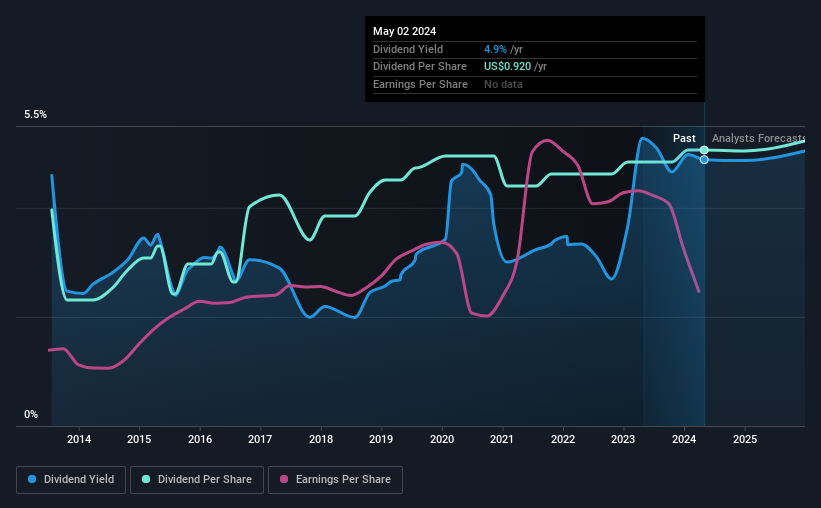Dividend Investors: Don't Be Too Quick To Buy Heritage Financial Corporation (NASDAQ:HFWA) For Its Upcoming Dividend
It looks like Heritage Financial Corporation (NASDAQ:HFWA) is about to go ex-dividend in the next three days. The ex-dividend date is one business day before a company's record date, which is the date on which the company determines which shareholders are entitled to receive a dividend. The ex-dividend date is an important date to be aware of as any purchase of the stock made on or after this date might mean a late settlement that doesn't show on the record date. This means that investors who purchase Heritage Financial's shares on or after the 7th of May will not receive the dividend, which will be paid on the 22nd of May.
The company's next dividend payment will be US$0.23 per share, on the back of last year when the company paid a total of US$0.92 to shareholders. Last year's total dividend payments show that Heritage Financial has a trailing yield of 4.9% on the current share price of US$18.84. If you buy this business for its dividend, you should have an idea of whether Heritage Financial's dividend is reliable and sustainable. That's why we should always check whether the dividend payments appear sustainable, and if the company is growing.
See our latest analysis for Heritage Financial
Dividends are typically paid out of company income, so if a company pays out more than it earned, its dividend is usually at a higher risk of being cut. Heritage Financial paid out more than half (66%) of its earnings last year, which is a regular payout ratio for most companies.
When a company paid out less in dividends than it earned in profit, this generally suggests its dividend is affordable. The lower the % of its profit that it pays out, the greater the margin of safety for the dividend if the business enters a downturn.
Click here to see the company's payout ratio, plus analyst estimates of its future dividends.
Have Earnings And Dividends Been Growing?
Companies that aren't growing their earnings can still be valuable, but it is even more important to assess the sustainability of the dividend if it looks like the company will struggle to grow. If business enters a downturn and the dividend is cut, the company could see its value fall precipitously. That explains why we're not overly excited about Heritage Financial's flat earnings over the past five years. Better than seeing them fall off a cliff, for sure, but the best dividend stocks grow their earnings meaningfully over the long run.
Another key way to measure a company's dividend prospects is by measuring its historical rate of dividend growth. In the past 10 years, Heritage Financial has increased its dividend at approximately 2.5% a year on average.
The Bottom Line
Has Heritage Financial got what it takes to maintain its dividend payments? Earnings per share have not grown at all, and the company pays out a bit over half its profits to shareholders. Heritage Financial doesn't appear to have a lot going for it, and we're not inclined to take a risk on owning it for the dividend.
With that being said, if you're still considering Heritage Financial as an investment, you'll find it beneficial to know what risks this stock is facing. For example, we've found 2 warning signs for Heritage Financial that we recommend you consider before investing in the business.
A common investing mistake is buying the first interesting stock you see. Here you can find a full list of high-yield dividend stocks.
Have feedback on this article? Concerned about the content? Get in touch with us directly. Alternatively, email editorial-team (at) simplywallst.com.
This article by Simply Wall St is general in nature. We provide commentary based on historical data and analyst forecasts only using an unbiased methodology and our articles are not intended to be financial advice. It does not constitute a recommendation to buy or sell any stock, and does not take account of your objectives, or your financial situation. We aim to bring you long-term focused analysis driven by fundamental data. Note that our analysis may not factor in the latest price-sensitive company announcements or qualitative material. Simply Wall St has no position in any stocks mentioned.
